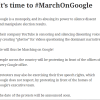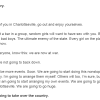Stephen Collinson at CNN doesn’t mince words.
A combative and unrestrained President Donald Trump opened his authentic political soul, in possibly the most memorable news conference in presidential history, that is certain to become a defining moment of his administration.
It was supposed to be a routine event at Trump Tower in New York to tout the President’s infrastructure plan.
But the session quickly veered off course into one of the most surreal political moments in years as Trump unloaded about the fallout from the weekend’s protests by “alt-right” activists, white supremacists and neo-Nazis in Virginia.
Gesticulating with this right hand, Trump blasted what he called the “alt-left,” protested that he had already condemned neo-Nazis and parroted far-right talking points on the Confederacy.
He did do a lot of gesticulating with that right hand. It went up and down, up and down, like a mechanical toy.
On the substance, it was a performance that quickly emboldened white nationalist groups and appeared certain to heighten racial tensions and fear in the country.
There’s no chance that Trump’s political team can finesse this one, or walk it back.
But the tone and the spectacle of Trump’s unchained performance was equally stunning.
The unapologetic, stream-of-consciousness style of delivery left no doubt at all: This was the real Trump, not the scripted version who appeared in the White House on Monday and tried to clean up his initial failure to condemn white supremacists after the death of a counter-protester in Charlottesville.
His anger emerged in a torrent, as he obliterated any benefit of the doubt he earned on Monday, thought piling on thought, in a style the nation has become accustomed to from his Twitter feed.
Not exactly thought piling on thought. Those weren’t really thoughts. Stunted half-formed bits of thoughts.
In the most incredible moment, as he stood at a podium bearing the seal of the President of the United States, Trump tore at the nation’s racial fault lines by appearing to offer a pass to a racist and neo-Nazi movement.
“I think there is blame on both sides,” Trump said, returning to his original position about the protest in Charlottesville, saying that an extreme right demonstration in which marchers held torches and Swastikas and chanted racist and anti-Semitic slogans contained some “bad people …. but you also had people that were very fine people, on both sides.”
Trump accused counter-demonstrators of being as violent as the white supremacists.
“What about the fact they came charging — that they came charging with clubs in their hands, swinging clubs? Do they have any problem? I think they do,” he said.
“I think there is blame on both sides,” Trump said.
The President’s fury was first sparked when he was challenged by reporters on his handling of Charlottesville, evidence of how Trump’s extreme sensitivity to personal slights sometimes leads him into politically self-destructive behavior.
It was a display that will renew questions about the suitability of Trump’s temperament for the presidency, and at a time of increasing tensions around the world that will exacerbate fears he will be unable to control his emotions at a time of crisis as commander-in-chief.
Yes. He was indeed in a towering temper, and he made it crystal clear how unpleasant and frightening he can be.
The rant about taking down the statues of Confederate traitors is right out of the white supremacist Big Book of Grievances.
“You’re changing history. You’re changing culture. And you had people, and I’m not talking about the neo-Nazis and the white nationalists, because they should be condemned totally. But you had many people in that group other than neo-Nazis and white nationalists.”
It did not take long for key figures in the extreme right movement to take comfort in Trump’s remarks, after the news conference appeared to nudge the President closer to an isolated spot on the far right of US politics.
“Thank you President Trump for your honesty & courage to tell the truth about #Charlottesville & condemn the leftist terrorists in BLM/Antifa, wrote David Duke, a former leader of the Ku Klux Klan, on Twitter.
That’s where we are.
The overall impression of Trump’s performance was of a president out of control, who is captive to his whims and instincts and defies any attempt to manage him — including by his new Chief of Staff John Kelly.
“That was all him — this wasn’t our plan,” a senior White House official told CNN’s Jeff Zeleny.
One person who has spent time with Trump over the past 24 hours describes the President as “distracted” and “irritable” in his interactions with top aides. Trump felt pressured into the Monday statement by staff members, the person said. As he went about his day Tuesday, Trump was upset and repeatedly returned to the topic, the person said, culminating in the lobby press conference.
CNN senior political analyst David Axelrod compared Trump to a “runaway truck, there are no brakes, there is no reverse.”
Axelrod also questioned why Kelly and other Trump aides even allowed the President to appear before reporters on Tuesday, given their presumed knowledge of the state of his mood over the Charlottesville coverage.
But ultimately, Tuesday’s stunning appearance will be remembered for the sentiments that passed the lips of a President of the United States.
In the long and tortured history of a nation still trying to work through its complicated story on race, Trump’s meltdown will stand out, as a moment ripped from the darkest pages of history and transposed into the 21st Century.
In the process, he appears to have abdicated any claim to the traditional presidential role as a moral voice for the nation and the world.
That’s where we are.






